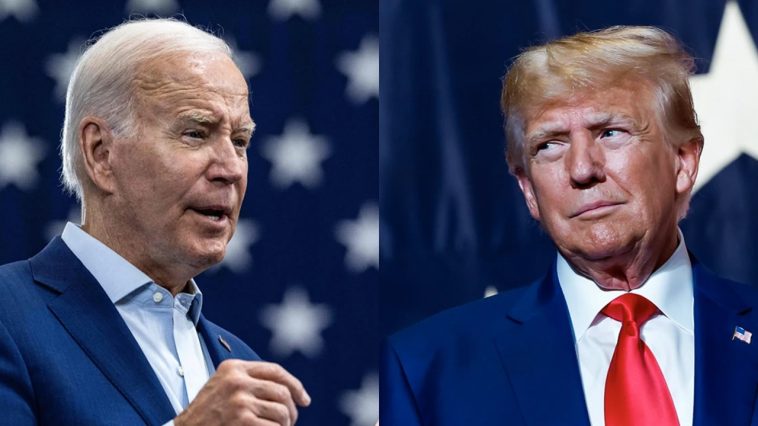In light of recent political developments, the former U.S. President Donald Trump appears to be having the upper hand ahead of his rival, current President Joe Biden. As per the latest New York Times and Siena College survey, if the 2024 presidential race were to take place at present with only Trump and Biden as contenders, nearly half of American citizens (48%) would back Trump. Meanwhile, approximately 42% of the surveyed 1,226 registered voters stated their preference for Biden. However, there’s an element of indecisiveness as 10% were uncertain or declined to vote.
Predictions based on initial polls point towards another direct clash between the two political heavyweights for the presidential role. Trump has been making impressive strides in key battleground states such as Georgia and Pennsylvania, which sided with the Democrats in the 2020 election. On the other hand, Biden still commands significant influence amongst the younger electorate, which has traditionally been instrumental in securing Democratic victories.
Renowned research website FiveThirtyEight, has established that the current sentiment amongst voters isn’t majorly in favor of either candidate serving a second term. According to them, the recent poll from New York Times/Siena College revealed that around 60% viewed Biden somewhat unfavorably or very unfavorably. A little over half of the respondents shared similar views about Trump.
Despite criticism from within their Politican parties, it seems Trump garners substantial support amongst Republican voters. Even though he was declared guilty on multiple charges of business document tampering a few weeks back, a significant 68% of respondents claimed that it had no effect on their decision to vote for him.
Biden’s standing in the polls has been rather underwhelming of late. As per Spencer Kimball, Executive Director of Emerson College Polling, those voters who are concerned with climbing living costs lean towards Trump, with a margin of 56% to 32%. Kimball’s observations bear further testimony to the fact that the choice of preferred candidate aligns with voters’ income perceptions.
In line with Kimball’s claims, Trump is leading in the Emerson College poll with 46% support compared to Biden’s 43%. Interestingly, while Biden’s vote share has declined by two percentage points as compared with an earlier Emerson poll this month, Trump has maintained his 46% share.
Emerson’s analysis also throws light on voters’ inclination towards Trump or Biden based on their weekly working hours. The preference for Trump seems striking among those who put in long hours. For instance, those logging more than 60 hours a week at work overwhelmingly favored Trump (80%) over Biden (7%).
Adding more detail from the Emerson poll, when independent candidates were considered, 44% of the respondents supported Trump, 40% backed Biden, and minor margins were observed for Robert Kennedy Jr. (8%) and Cornel West (1%). There were also 8% of the voters who were yet to make up their minds.
In the same poll, Kennedy Jr. managed to secure 13% of the independent voters’ support and appealed to about 12% of voters under 30 and 9% of Black voters. In a hypothetical context for the 2024 congressional elections, a generic Democrat and Republican candidate are at a statistical tie with 45% of the voters’ backing. However, 11% remain undecided.
Focusing on the undecided voters in the presidential race, 31% showed support for the Democratic congressional candidate, and 19% for the Republican; half of them were unsure about the choice for congressional elections. The economy emerged as the top concern for 36% of voters, followed by immigration (21%), threats to democracy (10%), healthcare (9%), abortion access (7%), and crime (6%).
Drawing from the general trend, 44% of voters consider their family income to be average, 38% below average, and 18% above average. When it comes to judging the state of affairs in the Israel-Gaza conflict, a majority (56%) confessed to being unsure if they were getting a truthful portrayal, while 25% believed they were, and 19% felt they weren’t.
Kimball also brought attention to a deep divide in voters’ perceptions of receiving accurate war information. Biden leads amongst those who believe they are getting accurate news (53% to 36%) and Trump gains the upper hand amongst the sceptics (53% to 38%). Voters who are uncertain lean towards Trump with a slender margin (44% to 42% in favor of Biden).
With these statistics, it appears that Biden is entering a critical phase. The eclectic mix of voters that rallied behind Biden, leading to his victory over Trump in the 2020 elections, might be faltering. This includes Black voters, as per a report by the Washington Examiner.
A recent survey indicated that 30% of Black men in seven swing states are considering voting for Trump, marking a huge leap from the mere 12% in 2020. The President still likely holds sway amongst the Black voters, with 57% committed to voting Democrat – a significant decline from 2020 – and potentially a threatening signal for Biden’s presidency.
The same poll revealed that 42% of Black women remain unsure or open to persuasion. Trump, who only received 6% of Black women’s votes in 2020, now reports that 11% are likely or definitely going to cast their vote for him. Adrianne Shropshire, head of BlackPAC, a Democratic super PAC, has said that the challenge isn’t merely to vote or not, but to lure voters away from third parties and Trump towards Biden.
This election cycle seems to be one of uncertainty and strategic persuasion in order to gather support. As events unfold, it is yet to be seen whether Biden’s coalition will hold strong or whether Trump’s appeal will continue to grow, especially amongst voters who were previously in the opposing camp.


